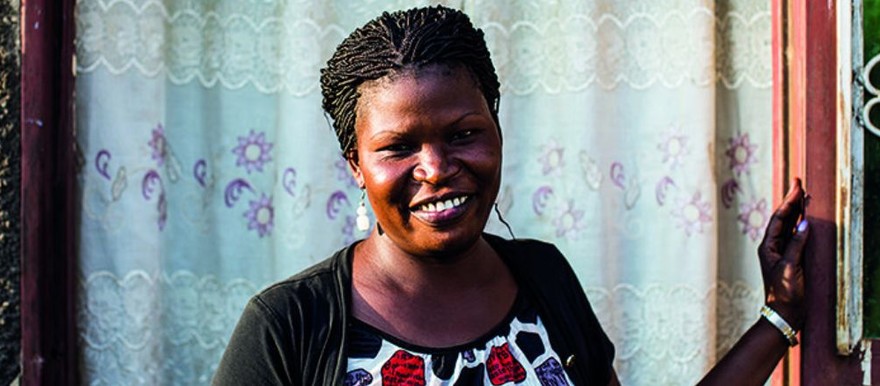Monica Samuel, a resident of Gudele neighbourhood in Juba, says she helped protect a Nuer man whom policemen tried to kill on the first full day of the crisis in South Sudan when it started last year.
On that day, 16 December, many Nuer men were rounded up and killed later that night in a police station in Gudele, according to UN and independent human rights reports.
Abraham, a Nuer living in Gudele, escaped with his life because Monica’s family intervened to persuade the police officers to leave him alone.
Monica, age 32, says that her cousin, an off-duty military officer, stood up to the policemen and told them to leave. Afterwards, she gave shelter to Abraham and his family at her home for weeks, until the situation calmed down and he could leave the country to safety.
Herself an Equatorian from the Mundari tribe, she says she and her cousin didn’t care whether Abraham was Dinka or Nuer but they took action because they felt they could not stand by and do nothing while an innocent man was targeted.
Monica Samuel: ‘We could not let anything happen to our neighbor’
I remember Jekudu running frantically into the house. My sister stopped abruptly and attempted to talk but her words were interrupted by her need for air. Each sentence was punctuated with pauses.
Someone was in trouble in the neighbourhood.
‘I was just at Cousin Peter’s house. There is a man there in trouble. They want to arrest him because he is Nuer,’ she said.
‘He was trying to leave with his family when a group of soldiers went to the house and are now trying to arrest him for no reason.’
The man was called Abraham. He was a young Nuer man with a wife and two children. They had sought refuge in a neighbour’s house after leaving their own in search of safety.
While hiding there, four local policemen knocked on the door and demanded that Abraham leave with them.
‘But how did they know he was there?’ I asked. ‘The neighbour that offered her house got scared. She is a Dinka lady and was convinced that if anyone found out that she was protecting a Nuer family, she would be in danger and her children would get hurt. She called the police to come and get him,’ Jekudu said.
‘But why didn’t she just ask them to leave?’ I asked, perplexed.
‘That’s what we’re all wondering,’ she said, visibly annoyed. ‘Peter and I heard the commotion in the compound of the house next door and went to find out what was going on.
We found four policemen trying to arrest a man. We knew he was Nuer from the marks on his face,’ she continued. ‘His wife and two children were there with him as well. He was refusing to leave with the soldiers.’
My cousin Peter is a senior official in the military and commands a lot of respect wherever he goes. He is a tall well-built man and when he speaks, people listen.
‘What is going on here?’ Peter asked. ‘Leave this man alone, he does not want to go with you.’
They argued for a few minutes and the men finally decided to leave. I am sure it’s because they realised he was in the military and that came with firepower when necessary.
Not more than twenty minutes later, the four policemen came back but with an additional eight men as backup. Peter heard the commotion and came out again to find out what was going on. Tension was rising around Abraham and use of force had been offered as an option.
‘Please, there are many families here, including my wife and children. Look at all the children around, listening to this conversation. No. I will not allow myself to be the reason they are hurt or killed,’ Abraham shouted. He then turned to Peter and said ‘Thank you but I would rather go. It will cause more problems if I stay here. People will get hurt. Let them take me.’
For the first time, everyone was quiet. It was like no one knew what to do. I am not sure if it was his resignation or his willingness to sacrifice himself that changed the course of events. Whatever it was, it was enough to make the 12 men lower their weapons and leave.
When things had settled down, we all sat down in Peter’s house to discuss options for Abraham’s family. They wanted to go straight to the UN House but we all agreed that it was not safe enough to go yet. Peter offered his house for Abraham to stay, but it did not have enough room for his wife and children.
‘They can stay with us,’ I said. And they did, for about three weeks before travelling to Torit where Constance, Abraham’s wife, now works.
Abraham stayed with Peter for about a week but with the help of his friend, Madam Angeth, who is a Dinka, he was able to get secure passage to the airport and then to Nairobi.
We are not Dinka or Nuer. We are Mundari from Central Equatorial but the wars and conflicts affect us as well. We could not stand aside and let anything happen to Abraham and his family.
It might have been risky but we had no second thoughts about it. We just knew that we were saving innocent lives.’
This text is part of a collection of personal testimonies published by the organization Oxfam, and is reproduced here as part of a series of survivor accounts to be published by Radio Tamazuj. If you or someone you know has a story to tell, please contact us.
Photo: Monica Samuel (Mackenzie Knowles-Coursin/Oxfam)
Related:
Stories of hope and survival: Rebecca Nyakuo
Stories of hope and survival: Kang John Bol
Stories of hope and survival: Akol Kuol
Stories of hope and survival: Nyabil Riel
Stories of hope and survival: Makuey Chol Bol




